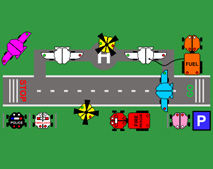The breakdown of cognitive control and its impact on adaptive behaviour
Abstract
Cognitive control processes allow humans to act in an adaptive and flexible manner to daily social challenges. One way to know the underlying cognitive control mechanisms is to measure these processes in pathological individuals. For instance, there are evidences about alterations in two main aspects of cognitive control, such as performance monitoring and cognitive flexibility, in violent individuals. Unfortunately, few studies have examined the relation between these processes and violent behaviour using electrophysiological measures.
Another way to know cognitive control mechanisms is to study their relation with reward-learning processes and structures. Along this line, acquiring the task structure or learning the complex representation of future actions together with the consequences of these actions (known as model-based learning or strategies), might constitute the basis of cognitive flexibility. Similarly, novelty processing is another critical aspect for flexible behaviour. Importantly, there are evidences indicating that both processes might be hippocampal-dependent. However, more research is needed to corroborate the relation between model-based strategies and the hippocampus, and to know if this structure is involved in processing other behaviourally relevant stimuli rather than novel.
The present dissertation aimed (i) to investigate the association between violent behaviour and cognitive control impairments in non-psychopathic violent juvenile offenders and (ii) to provide evidences of the relation between hippocampal damage and cognitive control dysfunctions in patients with mesial temporal lobe epilepsy with hippocampal sclerosis (TLE-UHS).
Study I focused on the comparison between violent juvenile offenders and healthy controls regarding two main aspects of performance monitoring (error monitoring and inhibition), using a Stop-Signal Flanker task and event-related potentials (ERPs). Performance monitoring deficits were encountered in violent juvenile offenders. It was detected by a larger stop-signal reaction-time, and in reduced ERPs related to error monitoring (Event-related negativity, ERN) and inhibition (stop-N2 and stop-P3), in the offender compared to the control group.
Study II aimed to compare two aspects of cognitive flexibility (set-switching and feedback processing) between violent juvenile offenders and healthy controls, with a Wisconsin Card Sorting Task and using ERPs. Alterations in cognitive flexibility were observed in the offender group by increased proportion of perseverative errors, but also with reduced amplitude of the P3 related to set-switching, increased feedback-related negativity (FRN) and P3 related to feedback processing compared to the control group.
Study III explored in TLE-UHS and healthy controls if the hippocampus is involved in cognitive flexibility, specifically in model-based strategies, using a probabilistic reversal learning task and voxel-based morphometric (VBM) measures. We detected an involvement of the hippocampus in the implementation of the model-based strategies that allow flexible behaviour. In this line, healthy controls could learn the task structure and could anticipate the reversals, which was not possible in TLE-UHS patients. In addition, an association between hippocampal grey matter volume and the implementation of anticipatory strategies was observed in control participants.
Study IV investigated in TLE-UHS and healthy controls if the hippocampus is related to processing novel and non-novel (target deviant) behaviourally relevant stimuli, using an oddball task, Laplacian transformed EEG and VBM measures. Evidences regarding the association between the hippocampus and the processing of novel but also non-novel deviant target stimulus were detected. These findings were encountered at behavioural level by a higher number of misses and slower RTs in the TLE-UHS group than in the control group. They were also corroborated by Laplacian measures, such as with a reduction in theta oscillatory activity in response to non-novel deviant target stimuli, by a reduction in the P3a component, and theta and low beta activities for novel stimuli.
The present work delineated the relation between alterations in cognitive control and flexible behaviour in violent individuals, extending previous findings to non-psychopathic violent offenders. Importantly, these findings could partially explain the perseverative maintenance of harmful behaviour in offenders despite the efforts of rehabilitation programs. The current work underlies the critical role of the hippocampus in flexible behaviour, specifically showing its relation to learning the task structure necessary to implement model-based strategies, but also in extending previous findings indicating the involvement of the hippocampus in processing novel stimuli, to the processing of other non-novel relevant stimuli.
To conclude, with a wide variety of results we highlighted how the integrity of cognitive control mechanisms and reward-learning related processes are critical to allow flexible behavioural adaptation in accordance to internal and environmental demands.

